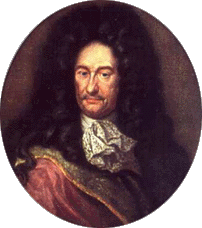

| Leibniz-Clarke Correspondence | |
|---|---|
 |
 |
G. W. Leibniz (1646-1716); Samuel Clarke (1675-1729)
[Course finished, but additions are made occasionally]
The following text seems old, but it is still the best, since it contains the editor's good introduction and relevant extracts from other sources. Paperback edition is available.
H. G. Alexander, ed., The Leibniz-Clarke Correspondence, Manchester University Press, 1956.
If this edition is unavailable (our book store said it is out of print), a newer edition is available:
Roger Ariew, ed., G. W. Leibniz and Samuel Clarke: Correspondence, Hackett, 2000. ISBN 087220524X
For general background knowledge of Leibniz' philosophy, the editor's introduction (by Woolhouse) in the following book is up to date and helpful.
Leibniz, Gottfried Wilhelm (Oxford Philosophical Texts), ed. by Francks, Richard and Woolhouse, R. S., Oxford Univ. Press, 1999.
A monograph devoted to Leibniz and Clarke is the following:
E. Vailati, Leibniz and Clarke, Oxford University Press, 1997.
Introduction
The Leibniz-Clarke controversy may be regarded as the last phase of Leibniz's quarrel with Newton. For the matter of the priority problem of the discovery of differential calculus, see Newton vs. Leibniz on Differential Calculus. However, aside from this historical curiosity, this correspondence has its own philosophical significance. Don't be misled by the old-fashioned terminology of Leibniz and Clarke. For instance, what are we going to make sense of such phrases as these?
Sir Isaac Newton says that space is an organ which God makes use of to perceive things by. But if God stands in need of any organ to perceive things by, it will follow that they do not depend altogether on him, nor were produced by him.
Sir Isaac Newton and his followers also have a very odd opinion concerning the work of God.
According to their doctrine, God Almighty needs to wind up his watch from time to time, otherwise it would cease to move. He did not, it seems, have sufficient foresight to make it a perpetual motion. (Leibiniz's first letter)Since he is talking about God, many readers may think that such arguments are irrelevant to the philosophy of space and time, at least of our time. But, wait a minute! If you study a bit of the histry of relativity and relativistic cosmology, you will see many similar questions were raised in different words: causality, initial conditions, boundary conditions, and the ultimate law (or theory).
For instance, do space and time exist before the big bang? The standard theory says "No", and this answer was somehow anticipated by Leibniz. Further, Gamov's original version of big bang theory assumed that the big bang somehow occurred with such-and-such initial conditions which we do not know. But is this acceptable to a physicist who aims at the ultimate theory of the universe? To many, this seemed unsatisfactory and that's why many tried to improve the cosmology by pushing the question further back to the very beginning, even before the big bang (the big bang occurred because of this and that, as a version of the inflationary cosmilogy may say). Still further, many physicists are eager to unify all the forces of nature (strong, weak, electromagnetic, and gravity): at the beginning, all forces were one. Isn't this quite close to Leibniz's assertion about God that unifies all causes within Himself?
Although I do not recommend a silly anachronism, many of Leibniz's or Newton's questions may be reconstructed in terms of the modern terminology. And that's why it is still worthwhile to examine this old and famous text. Accordingly, I will freely add materials of modern cosmology which seem to be relevant to the sort of problems Leibniz and others considered. This way, I believe, Leibniz's text becomes more interesting and exciting!
References for the Beginner (for the background of physics)
福江純『100歳になった相対性理論』講談社、2005年
佐藤勝彦『「相対性理論」の世界へようこそ』PHP文庫、2004年
菅野礼司・市瀬和義『相対性理論』PHP研究所、2005年
内井惣七『アインシュタインの思考をたどる』ミネルヴァ書房、2004年
LINKS
The Leibniz-Clarke Correspondence 1 (by S. Uchii)
The Leibniz-Clarke Correspondence 2 (by S. Uchii)
Biography of Leibniz (at St. Andrews)
The Principle of Sufficient Reason
The Principle of Sufficient Reason, Clarke's Version
Newton on the God's Intervention
Concepts in Specimen Dynamicum
Review of The Fabric of the Cosmos (B. Greene) and Three Roads to Quantum Gravity (L. Smolin)
An Informational Interpretation of Monadology
Quantum Gravity and Philosophy (inJapanese) New
ASSIGNMENTS
FIRST ASSIGNMENT (due May 13, Fri.)
Last modified, Apr. 20, 2008. (c) Soshichi Uchii
webmaster